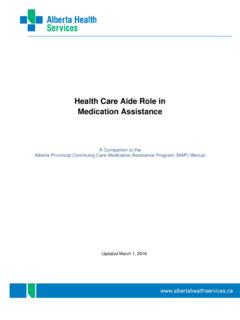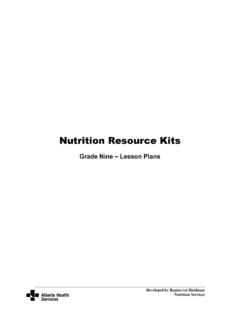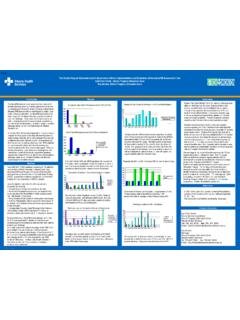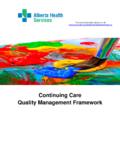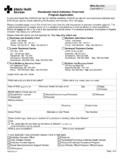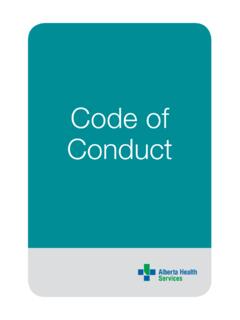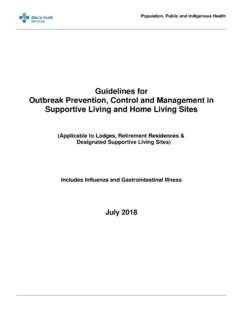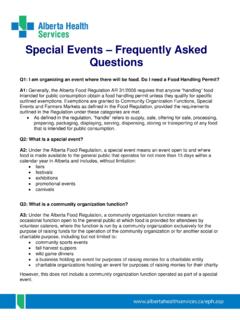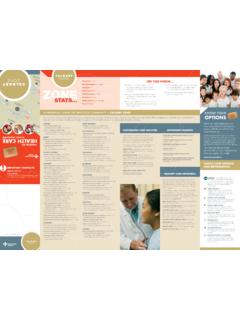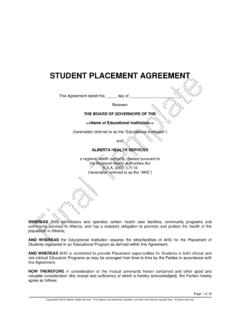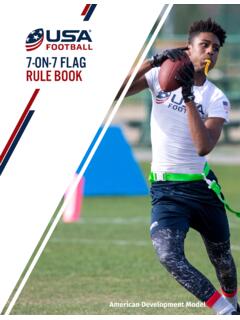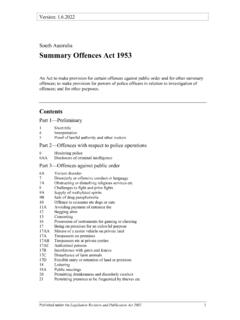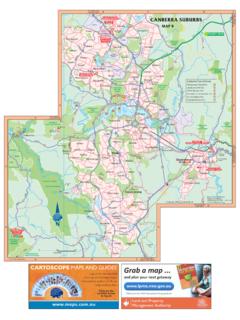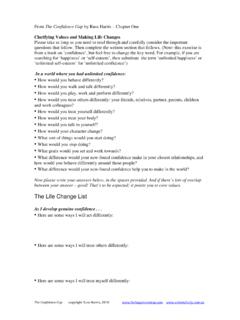Transcription of Sports Nutrition for Youth: A handbook for Coaches
1 1 Nutrition Services Sports Nutrition for Youth: A handbook for Coaches 2 Copyright (2018) Alberta Health Services. This material is protected by Canadian and other international copyright laws. All rights reserved. These materials are intended for general information only and are provided on an "as is", "where is" basis. Although reasonable efforts were made to confirm the accuracy of the information, Alberta Health Services does not make any representation or warranty, express, implied or statutory, as to the accuracy, reliability, completeness, applicability or fitness for a particular purpose of such information. These materials are not a substitute for the advice of a qualified health professional. Alberta Health Services expressly disclaims all liability for the use of these materials, and for any claims, actions, demands or suits arising from such use. This material may be reproduced without permission for non-profit education purposes.
2 This material may not be changed without written permission from Document Title Goes Here Third title/description goes here 3 Table of Contents Introduction Purpose of this handbook .. 5 Learning Outcomes .. 6 How to Use the handbook .. 6 Coaches Coaches : A Source of Nutrition 7 Healthy Eating Eating Well with Canada s Food Guide .. 9 Alberta Nutrition Guidelines An Overview .. 15 Alberta Nutrition Guidelines for Children and Youth .. 15 Alberta Nutrition Guidelines for Adults .. 16 Alberta Health Services, Healthy Eating Starts Here .. 17 Healthy Eating Environment Promoting Healthy Eating at School .. 19 Promoting Healthy Eating in Community Recreation Centres .. 24 Promoting Healthy Eating at Home .. 27 Sports Nutrition and Hydration Nutrition and Hydration Guidelines Before Activity .. 31 Nutrition and Hydration Guidelines During Activity .. 34 Nutrition and Hydration Guidelines After Activity .. 41 Planning for Tournaments, Competitions, and Travel .. 45 Special Considerations Vegetarian Eating.
3 49 Positive Body Image: Helping Young Athletes Accept Their Body Weight, Size, and Shape .. 52 Nutrition Supplements for Young Athletes .. 64 Guidelines for the Safe Use of Nutrition Supplements .. 67 Vitamin and Mineral Supplements .. 67 Nutrition Ergogenic Aids .. 68 Protein and Amino Acid Supplements .. 69 Creatine .. 70 Caffeine .. 72 Natural Health Products .. 76 Alcohol and Sports Performance .. 79 Conclusion .. 87 4 Appendices Sample Letters of Support for Healthy Eating in Recreation Settings Coaches .. 90 Athletes .. 91 Parents .. 92 Patrons/Community Members .. 93 3-Day Food and Activity Journal .. 94 Sports Drinks .. 96 Homemade Citrus Sports Drink .. 96 What Nutrients Should Sports Drinks Provide? .. 97 Evaluate Your Sports Drink Activity .. 98 Tournament Menu Planning Activity .. 100 Sports Nutrition Travel Checklist for Coaches .. 103 Sports Nutrition Travel Checklist for Athletes .. 107 What Should I Drink When I am Active?.
4 109 How Much Should I Drink When I am Active? .. 110 What Should I Eat Before Activity? .. 111 What Should I Eat During Activity? .. 113 What Should I Eat After Activity? .. 114 Glossary of Terms .. 115 References 5 Introduction Good Nutrition accounts for 50% of my performance, with 40% being mental and 10% being physical. Five-Time Canadian Olympian Hayley Wickenheiser Proper Nutrition and hydration have a major impact on young athletes health and Sports performance across all levels of training and competition. When athletes want to improve their physical skills whether it is strength, speed, endurance, or power they need to train well and eat well. Athletes who invest time to plan for healthy eating and hydration get more out of their training, perform better during competition, refuel their bodies faster, and have less illness and injury.(1) Athletes often look to Coaches as the most trusted source of Nutrition information over parents, friends, teachers, or dietitians.
5 (2) It is vital that Coaches act as healthy role models who support athletes to make smart food choices for improved overall health and sport performance. Coaches can also work with parents, athletes, teachers, and the community to create healthier eating environments that support athletes to eat well at home, at school, on the road, in recreation centres, and in other spaces where they train or compete. When the healthy choice is the easy choice, athletes are more likely to eat well and perform better. The information in this handbook is based on current research and best practice in Sports Nutrition at the time of publication. For young athletes, proper Nutrition is more important than ever because they must eat well to support both healthy growth and optimal Sports performance. Active youth need to learn how to follow a well-balanced approach to eating which includes healthy amounts of fluid, protein, fat, carbohydrate, and other key nutrients. Purpose of this handbook Sports Nutrition for Youth: A handbook for Coaches has three main purposes: To help school and community Coaches support young athletes and their parents in making informed choices around good Nutrition and hydration for Sports performance.
6 To provide ideas on how Coaches can help build healthier eating environments for athletes at home, at school, on the road, and in recreation centres. To help Coaches address unique concerns such as vegetarian diets, body image, alcohol, and Nutrition supplements. Please Note: This handbook aims to support Coaches who work with recreational athletes, rather than elite athletes. Coaches should always consult a Sports dietitian for young athletes who compete at an elite level or who need special Nutrition advice. The College of Dietitians of Alberta maintains a list of registered dietitians in the province who focus on Sports Nutrition . The Coaches Association of Canada also provides a list of Sports dietitians. 6 Learning Outcomes By using the information in this handbook , Coaches will be able to: Speak to the value of eating healthy every day to support an athlete s training plan and well-being. Understand and value their role to promote healthy eating in the home, at school, in the community, on the road, and in recreation centres.
7 Provide ideas for good eating habits by using Canada s Food Guide. Help athletes learn to make healthy food and fluid choices to fuel their bodies before, during, and after activity when they train, compete, or travel. Address special concerns that may affect some athletes: the effects of alcohol on health and Sports performance the safe use of Nutrition supplements body image issues Locate and use other credible online resources and tools that can support athletes and parents. Locate and use credible online resources and tools that help build healthy eating environments at home, at school, in the community, on the road, and in recreation centres. Identify when to refer athletes to health professionals or Sports dietitians for support. How to Use this handbook Each chapter follows the same format and has three to five key sections: 1. Key Teaching Points that spotlight the main Nutrition messages from the chapter. When you don t have time to cover all of the information, you can refer to the key teaching points for ideas to share with your athletes.
8 2. Background Information that provides more detail and research about the topic of each chapter. This section explains the what and why behind the key messages and includes details such as meal, snack, and drink examples. 3. Role of the Coach which outlines many ideas on how Coaches can support the key messages of the chapter. 4. Teaching Tools and Resources which are available online and can help Coaches add more detail when talking about Nutrition issues with athletes and parents. These tools and resources include websites, articles, handouts, or activity sheets that can be passed along to your athletes and parents to provide extra ideas to help athletes eat healthy. 5. Suggested Activity which offers Coaches ideas on specific activities for use with their athletes to help teach the key messages of the chapter. The Glossary of Terms in the appendices provides definitions for many key words that may be new to some readers. 7 Coaches Coaches : A Source of Nutrition Information Key Teaching Points 1.
9 Young athletes often view Coaches as the most trusted source of Nutrition information. 2. Coaches can support their athletes to eat healthy by sharing the information in this manual with athletes and their parents. 3. Coaches can lead new ways to work with athletes, parents, teachers, and other key decision makers to ensure healthy food choices are available in the settings where athletes live, study, train, compete, and play. Background Information Coaches play an important role in teaching athletes and their parents about Nutrition and Sports performance because the coach is often viewed as the most trusted source of Nutrition information.(2) There are three key environments which impact the food choices of teen athletes: home, schools, and recreation centres. When Coaches educate athletes, parents, teachers, and the community about healthy eating for Sports , it may create more demand for better quality food options in all of these environments. This could inspire athletes, parents and spectators to select healthier foods.
10 Role of the Coach How to Talk About Sports Nutrition with Young Athletes Use the information in this handbook to teach or remind athletes and parents about healthy eating habits to provide fuel for better Sports performance. Offer a session on Sports Nutrition for parents and/or athletes where you outline the role of Nutrition and healthy eating goals for Sports performance. Set Nutrition targets for teams and athletes. Good examples include: to plan healthy food choices at home, at school, in the community, and on the road to plan healthy meals, snacks, and drinks before, during, and after training or competition to plan healthy meals, snacks, and drinks during travel Work with athletes, parents, teachers and community members to assess and promote healthy eating environments in schools and recreation centres. Include a healthy eating tip of the week on schedules. 8 Talk about healthy food and drink ideas while travelling on a bus or when athletes are changing orstretching.
